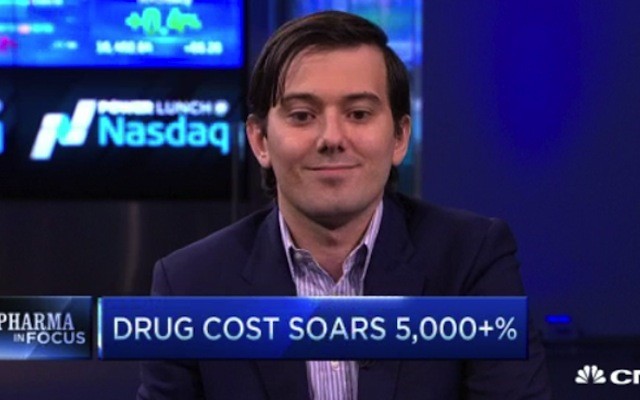US Pharmaceutical Industry Price-Gouging and the Case of Martin Shkreli
CAPITALISM, 28 Sep 2015
Nick Barrickman, WSWS – TRANSCEND Media Service
24 Sep 2015 – The decision by biotechnology firm Turing Pharmaceuticals to raise the cost of Pyrimethamine (or Daraprim), a drug used to treat toxoplasmosis, from $13.50 to more than $750 per pill, has aroused shock and outrage. Toxoplasmosis is a parasitic disease to which people with weakened immune systems from of diseases such as AIDS, as well as certain cancer patients, as well as unborn babies, are susceptible.
The more than 4,000 percent overnight price jump would have deprived large numbers of people of a desperately needed medication.
Pyrimethamine has been on the market for nearly 62 years in a relatively unaltered form. Turing Pharmaceuticals cornered the market on the drug a little over a month ago. CorePharma, the drug’s previous owner, had increased the cost of Daraprim from nearly $1 a pill to $13.50 several years earlier, lifting profits on the drug from $667,000 in 2010 to $6.3 million a year later.
Upon news of the price hike, thousands took to social media to protest against the company and its CEO, Martin Shkreli. The anger was further fueled by the stance taken by Shkreli, a 32-year-old former hedge fund manager, who unapologetically defended the move on social media and in interviews on the grounds that it served his company’s bottom line. ABC News described Shkreli as “the most hated man in America.”
In an interview with CBS, the drug entrepreneur commented, “There’s no doubt, I’m a capitalist… I’m trying to create a big drug company, a successful drug company, a profitable drug company. We’re trying to flourish.” Later, the CEO sought to assuage the public outcry by asserting that any additional profits accrued through sales of the drug would be used to develop more efficient treatments in the long run; a prospect that health care experts regarded with skepticism due to the drug’s current effectiveness.
Throughout the week, news outlets have published material related to the unscrupulous practices of Turing Pharmaceuticals’ CEO, including the latter’s role in pressuring the Food and Drug Administration (FDA) not to approve drugs made by companies whose stock he was short selling. Board members for Retrophin dismissed Shkreli last year and opened a $65 million lawsuit against him alleging he sought to use the biotech firm as a means to pay back investors from a previous hedge fund he had managed. While at Retrophin, Shkreli gained ownership of medication for kidney disease and promptly raised the prescription cost 20 times over.
After several days of negative publicity, letters from Congressional representatives and a public statement released by the industry lobbying group PhRMA disavowing the company’s decision, Shkreli said that he would lower the drug’s cost “to a point that is more affordable and is able to allow the company to make a profit, but a very small profit” in a Wednesday interview with ABC . Shortly afterward, Shkreli removed his Twitter social media account from public view and declined to give any further comments to the press.
While the popular fury at Shkreli’s profiteering is entirely justified, the media’s shock and outrage at his actions are self-serving nonsense. In the final analysis, Shkreli’s actions represent nothing more than an unabashed and especially brazen form of everyday business practice under capitalism. The “outrage” of the official establishment is no more than this: the fear that the actions of less savvy and shameless operators such as Shkreli will spoil things for everyone else.
This was spelled out in a nervous comment posted on the Nasdaq stock exchange’s web site . “It has … been a bad week for capitalism,” remarked financial consultant Martin Tillier about the recent scandals involving Turing and Volkswagen, which was threatened with billions in fines this week for skirting emissions regulations in the US. The Nasdaq consultant went on: “We have been treated to two examples of what Karl Marx once called ‘Capitalism red in tooth and claw.’ It is an indication of the depths to which the two companies have sunk that the best description of their behavior comes from that source.”
The politicians’ “outrage” is as hypocritical and hollow as the media’s. Hillary Clinton, the frontrunner for the Democratic Party’s 2016 presidential nomination, tweeted on Monday that “Price gouging like this in the specialty drug market is outrageous. Tomorrow I’ll lay out a plan to take it on.” The next day, Clinton proposed a $250 per-month price cap on prescription drugs, a cost which, were it implemented (which it will not be), would still place vital medication out of the reach of many working people.
“Price gouging,” or the extortion of huge amounts of money from captive (and often ill) consumers, is an essential feature of the pharmaceutical industry. This week, biotech firm Rodelis Therapeutics rescinded a proposed hike on prices for a tuberculosis treatment from $500 to over $10,800 for 30 pills (or 2,600 percent) when the public backlash over the Daraprim price hike began to grow.
The price of many generic drug treatments has also risen dramatically. Last May, the world’s largest generic drug producer, Teva Pharmaceuticals, agreed to pay $1.2 billion to settle a lawsuit by the Federal Trade Commission, which argued that the company had blocked competition and limited consumer choices in the production of a profitable sleep aid.
 In 2012 and 2013 alone, a number of generic drugs increased massively in cost, including captopril, which treats hypertension (from 1.4 cents a pill to 39.9 cents); clomiphramine, which treats Obsessive Compulsive Disorder (from 22 cents to $8.32 per pill); and doxycycline hyclate, a widely applicable antibiotic available since 1967 (from 6.3 cents to $3.36 per pill in one year).
In 2012 and 2013 alone, a number of generic drugs increased massively in cost, including captopril, which treats hypertension (from 1.4 cents a pill to 39.9 cents); clomiphramine, which treats Obsessive Compulsive Disorder (from 22 cents to $8.32 per pill); and doxycycline hyclate, a widely applicable antibiotic available since 1967 (from 6.3 cents to $3.36 per pill in one year).
Mergers and acquisitions have allowed individual firms to corner the market. A January 2015 article in the New York Daily News noted that drug industry-related deals contributed to over 20 percent of last year’s record $1.41 trillion in profits made by corporations from mergers and acquisitions.
A July article in Fortune observed that a key factor contributing to this wave of mergers and acquisitions was the role of financial speculation. “Pharma companies believe acquisitions are the only way to keep their revenues growing as fast as investors expect,” the article says, adding, “in this fast-moving environment, some serial pharma acquirers say they can hammer out deals in less than a day, even hours—assuming their target is willing to be bought.”
Media commentators have worked hard to avoid drawing connections between such displays of parasitism and avarice and the policies of the Obama administration that have abetted them. One of the aims of the Affordable Care Act, also known as Obamacare, has been to force the rising cost of health care onto the backs of individuals to improve the balance sheets of corporations, which are no longer required to provide health care coverage to workers. Far from a “reform,” this legislation was crafted to cater entirely to the interests of big business.
Obama recently named Robert M. Califf as his nominee to head the Food and Drug Administration. Prior to his nomination, Califf oversaw a multi-million dollar research facility at Duke University that obtained over 60 percent of its funding from the pharmaceutical industry. “In a sense, he’s the ultimate industry insider,” Harvard University political science professor Daniel Carpenter told the New York Times.
DISCLAIMER: The statements, views and opinions expressed in pieces republished here are solely those of the authors and do not necessarily represent those of TMS. In accordance with title 17 U.S.C. section 107, this material is distributed without profit to those who have expressed a prior interest in receiving the included information for research and educational purposes. TMS has no affiliation whatsoever with the originator of this article nor is TMS endorsed or sponsored by the originator. “GO TO ORIGINAL” links are provided as a convenience to our readers and allow for verification of authenticity. However, as originating pages are often updated by their originating host sites, the versions posted may not match the versions our readers view when clicking the “GO TO ORIGINAL” links. This site contains copyrighted material the use of which has not always been specifically authorized by the copyright owner. We are making such material available in our efforts to advance understanding of environmental, political, human rights, economic, democracy, scientific, and social justice issues, etc. We believe this constitutes a ‘fair use’ of any such copyrighted material as provided for in section 107 of the US Copyright Law. In accordance with Title 17 U.S.C. Section 107, the material on this site is distributed without profit to those who have expressed a prior interest in receiving the included information for research and educational purposes. For more information go to: http://www.law.cornell.edu/uscode/17/107.shtml. If you wish to use copyrighted material from this site for purposes of your own that go beyond ‘fair use’, you must obtain permission from the copyright owner.
